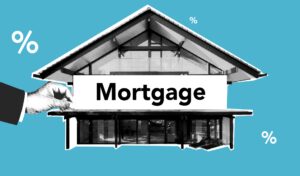This is not a simple question to answer, however what we can anticipate based on historical events and the latest government regulations that are being put in place, that buyers will likely have lower mortgage offers from lenders and therefore smaller budgets when putting offers on homes.
The problem; Interest rates rise to a 13-year high.
Nearly two million homeowners will face higher mortgage repayments after the Bank of England increased interest rates for the fifth consecutive time.
Key takeaways
- The Bank of England has increased interest rates five times in a row, lifting the official cost of borrowing to a 13-year high
- In June, the Bank Rate increased from 1% to 1.25% , increasing monthly repayments by around £24 a month for someone with a £200,000 mortgage
- If you’re on a standard variable rate or tracker mortgage, it’s a good idea to fix now, as interest rates are likely to go up again over the coming months
The Bank of England has increased interest rates for the fifth consecutive time, lifting the official cost of borrowing to a 13-year high.
Its Monetary Policy Committee increased the Bank Rate from 1% to 1.25% as it continues to battle the rising cost of living.
Three members of the committee voted to raise interest rates by an even more aggressive 0.5%, suggesting there will still be further increases to come.
The move means around two million homeowners with variable rate mortgages will see their monthly mortgage repayments rise.
The latest increase will add around £24 a month to a £200,000 mortgage, bringing the cumulative increase since rates first started to rise to £114 a month.
It comes at a time when consumers are already suffering from steep increases in food, petrol and energy costs.
What can I do if I’m struggling to pay my mortgage?
Why is this happening?
Like many central banks around the world, the Bank of England is increasing interest rates in a bid to control inflation, which measures rises to the cost of living.
Inflation as measured by the Consumer Prices Index is currently running at 9%, its highest level for 40 years, and it is expected to hit 11% later this year.
To put this in context, the Bank of England is supposed to keep inflation at around 2%.
High inflation is currently a global problem due to a combination of high energy and fuel prices, which impact the cost of goods, disruption to the supply chain caused by Covid-19 and the conflict in Ukraine.
Who does it affect?
Not everyone will be impacted by the latest increase.
Nearly three-quarters of homeowners have a fixed rate mortgage, and they will not see any change to their monthly repayments until their current deal ends.
But the news is less good for those with a variable rate mortgage.
Around 850,000 people are currently on a tracker mortgage, with a further 1.1 million on a standard variable rate one.
These homeowners will see their monthly repayments increase by around £24 a month if they have a £200,000 mortgage, adding to the previous increases they have already seen since December.
What should I do now?
If you are coming to the end of a fixed rate mortgage, start looking for a new deal now.
Although the interest rate rises seen since December will already have been priced into new deals, further increases are expected in the months ahead.
You can ‘book’ a mortgage offer up to six months in advance of your current deal ending.
With rates only heading in one direction, try to line up a new deal as soon as possible.
You should also look for a new mortgage of you are currently on your lender’s standard variable rate.
The average interest rate charged on standard variable rates is currently 4.91%, meaning you could save £189 a month if you switch to a typical two-year fixed rate product of 3.25%, based on a £200,000 mortgage.
If you are on a tracker deal, which moves up and down in line with changes to the Bank Rate, it may not be possible to remortgage without paying early redemption penalties.
Check with your lender to find out if this is the case. If you can exit your current deal without penalties, you may want to consider remortgaging onto a fixed rate deal to protect yourself from further interest rate rises.
Economists are predicting the Bank Rate could rise to 3% next year.
If you are struggling to pay your mortgage, contact your lender as soon as possible.
There are a number of steps they can take to help you, including giving you a temporary payment holiday or putting you on to an interest-only mortgage for a short time.
But options become more limited if you have already missed a payment.
The solution? Mortgage affordability rules relaxed
The latest move by the Bank of England to relax mortgage affordability rules should make it easier for first-time buyers to take out a mortgage.
Key takeaways
- The Bank of England has increased interest rates five times in a row, lifting the official cost of borrowing to a 13-year high
- In June, the Bank Rate increased from 1% to 1.25% , increasing monthly repayments by around £24 a month for someone with a £200,000 mortgage
- If you’re on a standard variable rate or tracker mortgage, it’s a good idea to fix now, as interest rates are likely to go up again over the coming months
The Bank of England has announced plans to relax mortgage lending rules from August 1 in a major boost for first-time buyers.
Borrowers currently have to show they would be able to afford repayments if their mortgage reverted to their lender’s higher variable rate and interest rates jumped by 3%.
But after consulting lenders and other members of the industry, the Bank’s Financial Policy Committee (FPC) has said it will scrap the rule this summer.
The change is great news for first-time buyers, who were most likely to have been caught out by the rule.
It comes at a time when rising interest rates and high house prices are already making it challenging for people to get on to the property ladder.
Why was this rule introduced?
A number of new affordability guidelines were introduced for lenders in 2014 to protect the banking system from high levels of debt following the financial crisis in 2008.
The FPC called on lenders to make sure borrowers could still afford their mortgage repayments when their fixed rate deal ended and if interest rates rose.
As a result, lenders had to make sure that monthly repayments were still affordable if borrowers were moved on to their reversion rate – typically known as the standard variable rate – and interest rates rose by 3%.
The FPC also asked lenders to limit the number of mortgages they offered to people borrowing 4.5 times their income to 15% of their total lending.
Why is it being scrapped now?
When the rule was introduced, interest rates were expected to rise to 2.25% in the coming five years.
When the FCA first launched its consultation around lifting the rule, it seemed highly unlikely that interest rates would hit this level in the years ahead.
As a result, the FCA thought the test was no longer needed.
But since then inflation has soared to a 40-year high of 9%, causing the Bank of England to raise interest rates five consecutive times to 1.25%.
While that is still well down on the 2.25% anticipated when the test was introduced, interest rates are now expected to rise to 3%, or possibly higher, next year.
The average standard variable rate is already just under 5%. If interest rates rise by a further 1.5%, borrowers would have to show they could afford a mortgage rate of 9.5%.
For example, if someone was borrowing £180,000 on a two-year fixed rate mortgage with an interest rate of 2.5%, their monthly repayments would be £815.
But they would have to prove that they could still afford their mortgage if the interest rate was 9.5% and their repayments were £1,590 a month – almost double the amount they would actually pay.
Such a tough test would exclude many people from taking out a home loan.
While the FCA has not commented on this issue directly, it is thought to be one of the reasons it is withdrawing the rule so quickly after the consultation concluded.
Officially, it has said that the rule limiting the proportion of customers who can borrow more than 4.5 times their income and other affordability checks are enough to ensure lending is responsible.
Who does it benefit?
The decision to withdraw the rule is good news for homeowners who have borrowed a relatively high proportion of their salary and would need to remortgage in the next few years.
It is particularly good news for first-time buyers, who typically have lower salaries and smaller deposits, making them more likely to struggle with the test.
Capital Economics estimates that when the stress test interest rate was 6.6%, the typical mortgage customer was able to borrow five times their income.
But if the rate used for the stress test hit 9.5%, the maximum amount they could borrow would drop to just four times their income.
Around one in four people currently borrow more than four times their income, so if the rule had stayed in place, many people would have struggled to get a mortgage.
In summary if buyers have smaller loans from mortgage lenders they will historically offer less on homes, the housing market often finds that it will pause, before house prices fall if they do at all. Then again if mortgage lenders are being more lenient in their lending this may not be as much of an issue as everyone had expected.
If you are selling now is likely the best time, even if you receive an offer that is 10% less than your anticipated sales price it could be wise to accept, where we expect interest rates to continue to rise toward the end of the year, you could be looking at lower offers in the coming months. Ultimately there will still be some buyers who may have greater affordability, but as more homes come to market that are not selling we find that buyers will have more negotiating power as they have a greater choice of homes to choose from.




